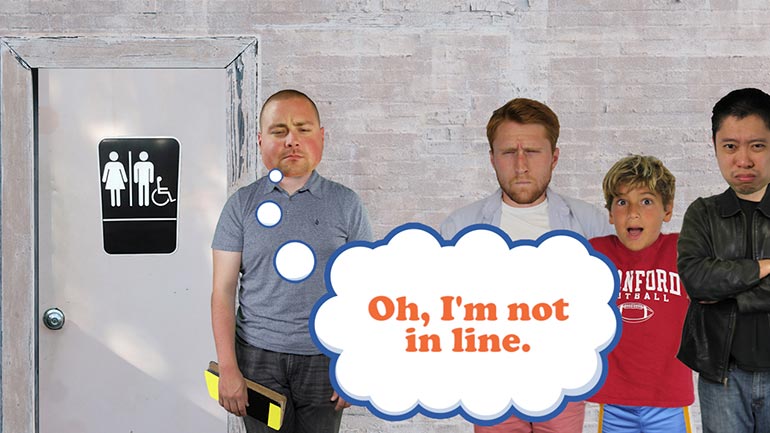ShmoopTube
Where Monty Python meets your 10th grade teacher.
Search Thousands of Shmoop Videos
Media Literacy Part 14: Bias Try Us 1330 Views
Share It!
Transcript
- 00:01
We speak student!
- 00:05
Media Literacy
- 00:07
Bias? Try us!
- 00:09
a la Shmoop
- 00:12
Bias? Try us.
Full Transcript
- 00:13
Deb, define for us what bias is.
- 00:16
Bias in the sense of prejudice.
- 00:18
Yes. Bias is basically belief,
- 00:23
either negative or positive, in one direction or another,
- 00:26
about a certain subject.
- 00:28
So, we usually think of bias as being negative.
- 00:30
I don't like a specific politician,
- 00:34
so I am biased against them.
- 00:36
But you can also be biased for something.
- 00:37
I do like that politician, then I am biased for them.
- 00:40
[ woo! ]
- 00:41
And the most important thing to remember about bias is that
- 00:44
everyone has a bias about everything.
- 00:48
Very few instances exist in which someone
- 00:51
is completely neutral about something.
- 00:55
So Shmoop, we're biased all the time and we say this in our lessons.
- 00:59
We think education is valuable.
- 01:01
That's a bias toward education.
- 01:03
So even if it's a bias that almost everyone agrees on, it's still a bias.
- 01:07
And it's just something to be aware of,
- 01:09
that you kind of believe whatever anyone says to you.
- 01:13
And you have to remember, well they believe what they're saying
- 01:16
for a specific reason. And maybe not everyone does agree with them.
- 01:19
Talk to us about some of the elements that
- 01:22
can help us identify bias.
- 01:26
So, let's say you're reading an article on the Internet
- 01:29
and you're trying to identify the bias in it.
- 01:30
The first thing you need to do is consider the source.
- 01:33
If that source is known for being
- 01:36
specifically biased in one direction or another --
- 01:38
The classic example is Fox news versus MSNBC.
- 01:41
You're reading Fox news, you kind of understand that it is
- 01:44
biased toward the right. You're reading MSNBC,
- 01:46
bias toward the left.
- 01:47
Just go into it knowing that.
- 01:49
It does not mean you cannot use those sources.
- 01:51
It just means you have to be aware of the bias.
- 01:53
So considering the source is important.
- 01:55
Considering the author.
- 01:57
Does that author have
- 01:59
a history of being biased in one direction or another?
- 02:02
[ evil laugh ]
- 02:03
Check out some other articles they've written.
- 02:05
Maybe this piece seems pretty neutral,
- 02:08
but then you Google the author
- 02:10
and you find out that they've written
- 02:11
a lot of letters to the editor
- 02:13
that are really left-leaning or right-leaning or really
- 02:16
pro-war, anti-war, whatever the case is.
- 02:19
Another thing to do is check for accuracy.
- 02:22
If the author is giving stats
- 02:25
or quoting things, make sure they're right.
- 02:27
If they're not accurate,
- 02:29
probably there's a lot of bias.
- 02:31
If everything they're quoting is accurate,
- 02:34
they're ideally less biased,
- 02:35
but then you have to check for omissions.
- 02:37
What stats aren't they quoting?
- 02:39
You have to make sure that they're considering both sides.
- 02:42
And that then leaves one of the last things,
- 02:45
which is oversimplification.
- 02:47
You wanna look in the source and say,
- 02:49
"Is this issue being oversimplified by the author?
- 02:53
Are they only showing one side of it
- 02:56
or are they making really broad statements
- 02:59
without getting into the nitty gritty?"
- 03:00
Because oversimplification can be a pretty obvious sign of bias.
- 03:04
Got it. Understood.
- 03:05
Where do we go for
- 03:07
a neutral perspective on things?
- 03:11
Are there any unbiased news sources?
- 03:15
No, there really doesn't exist an unbiased source.
- 03:18
There are certain sources that
- 03:20
are more -- The BBC is a good example, right?
- 03:24
Where it's slightly more reliable than MSNBC or Fox News,
- 03:27
for sure.
- 03:28
But you kind of want to base it more
- 03:31
on the individual author or speaker of the source,
- 03:35
because every source is leaning in one direction or another.
- 03:38
So when it comes to the news
- 03:40
and current events, almost every single thing you see is going to be biased.
- 03:46
[ whoop ]
- 03:47
What is bias?
- 03:49
How can we identify bias?
- 03:53
Are there are any unbiased news sources?
- 03:58
[ silly laugh ]
Up Next
Related Videos
What's the difference between a real estate agent and a real estate broker? Is the latter just, uh... out of cash? Quite the opposite, in fact. Jum...
So... what's a TSA worker, and what do they do? Oh, we thought maybe you knew. Okay, okay... so TSA (or Transportation Security Administration) wor...




